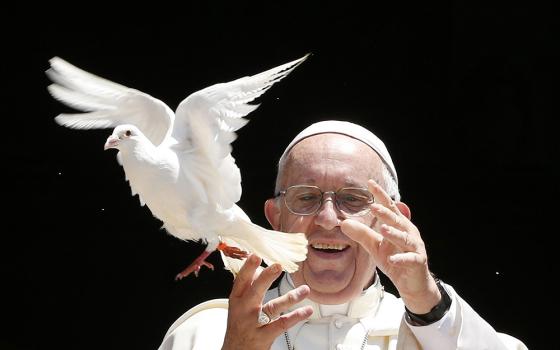The author's photo of Luis Cantabrana's public shrine to the Virgin of Guadalupe in Santa Ana, California. (Courtesy of Gustavo Arellano)
Every holiday season for the past 11 years, Luis Cantabrana has transformed the front of the house where he lives in Santa Ana, California, into one of the most beautiful public shrines to the Virgin of Guadalupe that I've ever seen.
The Mexican immigrant forms rows of white Christmas lights into a giant cross that lies flat on the roof. In a gable, he erects a large cast-iron sign that reads "VIRGEN DE GUADALUPE" and wraps it in green and red lights. Above that is a small retablo of Mexico's patron saint.
The author's photo of Luis Cantabrana's public shrine to the Virgin of Guadalupe in Santa Ana, California. (Courtesy of Gustavo Arellano)
Cantabrana then drapes thousands of green and red lights on either side of the porch to mimic the colors of the Mexican flag. He turns the porch into an elaborate altar for la Lupita — candles and roses on the front steps, fake roses and more lights swirling around the porch's beams. Where a doormat usually sits, he places a 4-foot tall statue of Guadalupe on top of a pedestal. Hanging from the front door behind her is a backdrop that changes every year — sometimes it's a blue background with cotton balls meant to mimic heaven, other times more fake roses. This year, Cantabrana set up a canvas photo of a desert landscape.
For nine nights leading up to Guadalupe's feast day on Dec. 12, dozens of people sit underneath a tent that hangs over the front lawn to pray the rosary and sing from the rich canon of guadalupana songs. Mariachis and Aztec dancers perform; people bring tamales and champurrado to stave off the cold. Even Bishop Kevin Vann of the Diocese of Orange, California, has stopped by to give his blessings. The display stays up through the New Year, the better to attract pilgrims and the non-believing curious alike from across Southern California and bask in the display's bright glory.
As long as I've known about this holy site, I've stopped by to offer my prayers, then take photos that I post on my Instagram account. They've always amassed hundreds of likes and comments almost instantly, almost all remarking how stunning and beautiful this expression of faith is, and many asking for the address to the house. It's a ritual that I look forward to every year, because it brings me joy to share Cantabrana's offering and allows me to spread Guadalupe's message of love and resilience, one I have believed in since childhood.
I did the same this year, posting earlier than usual on Dec. 1. On Dec. 13, the day after her feast day, I received a curious message from Meta, the parent company of Instagram: They were taking down my photo of the Guadalupe shrine because it violated their community guidelines that prohibits the promotion of "violence or dangerous organizations."
Advertisement
I checked my hashtags to see if something crude might have slipped in — nothing. I zoomed in to every possible detail of my photo looking for the same — nada. Later that night, when I did my weekly Instagram live session where I take questions from my followers, I realized I was now limited to just an hour instead of the unlimited time I was allowed for years. My fans could no longer buy badges.
I've gotten in trouble with Meta before. On the morning of President Joe Biden's inauguration, I posted a video of me tossing a Donald Trump piñata head into a garbage can, then waving goodbye and flashing the peace sign. That was taken down. A comment I made in February last year calling Canadians "hosers," a slang term long used in American and Canadian comedy to refer to our Northern neighbors, is still under review to determine if it constitutes "hate speech."
Intelligent minds can disagree as to the worth of those posts. But my Guadalupe photo was none of that — not even close.
I asked Meta for an appeal. Three days later, an unsigned message stated that their review "confirmed that [the Guadalupe posting] goes against our Community Guidelines."
Instagram no longer allows users to find my account via its Explore, Reels and Feed recommendations features. If I go into my account status, a message stating "You could lose access to your account in the future" greets me.
If it was for anything else, I'd dismiss my brouhaha as social media gone hilariously awry. But that it involves Guadalupe has enraged me in a way few things ever have.
All I know is that Meta continues to keep the Virgen de Guadalupe in Instagram jail. I also know that while the Empress of the Americas isn't welcome, Donald Trump is.
On Jan. 25, Meta president of global affairs Nick Clegg announced his company would allow Trump to return to its Facebook and Instagram platforms in the coming weeks. He defended Meta's decision to suspend Trump for two years in the wake of his support for the Jan. 6, 2021, insurrection, after years of spewing various falsehoods and general nastiness — but also Meta's decision to allow him back.
"We believe it is both necessary and possible to draw a line between content that is harmful and should be removed, and content that, however distasteful or inaccurate, is part of the rough and tumble of life in a free society," Clegg wrote in his justification.
I understand Meta and other social media companies are private entities that can be as capricious as they want to be. But I can scroll on Instagram right now and find all sorts of bona fide hate speech and images against Mexicans, or photos hailing drug cartels that Meta will never take down.
Yet Guadalupe is verboten?
All I know is that Meta continues to keep the Virgen de Guadalupe in Instagram jail. I also know that while the Empress of the Americas isn't welcome, Donald Trump is.
I've gladly used Instagram for over a decade, feeding daily updates to it like if they were tithings. I gained new fans and have even developed true friendships from it. But I cannot continue to so mindlessly and gladly use a platform that treats Guadalupe the way they have.
How is this apparition of the mother of God, who has comforted millions ever since she appeared to St. Juan Diego in 1531 outside Mexico City, bad but Trump OK?
Our social media behemoths are so removed from what's actually holy because they're so addicted to their online omnipotence. Society has allowed them to function like a religion for too long, myself included.
Not anymore.
I'll keep my Instagram account. But ever since this ordeal started, I'm using it less and less. Because of my defiance, Instagram's algorithms have begun to punish me. Already, my posts aren't getting as many likes or visibility as before.
Really, I continue to use Instagram for one specific purpose, my Instagram live sessions. Because just before I start to answer questions nowadays, I hold up a black-and-white printout of the same Virgin of Guadalupe photo Instagram found offensive, and proceed to utter a litany of vulgarities as I denounce Meta CEO Mark Zuckenberg, Instagram and Facebook for what they did.
I probably shouldn't use the f-word anywhere near Guadalupe. But she forgives sinners; Meta doesn't. I cast my fate with her.






